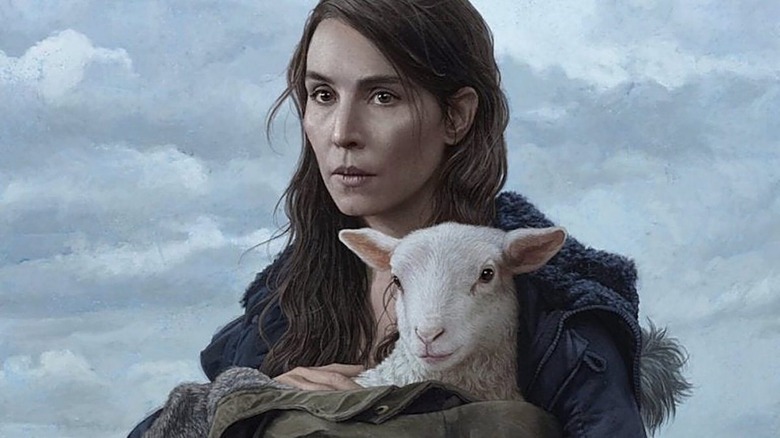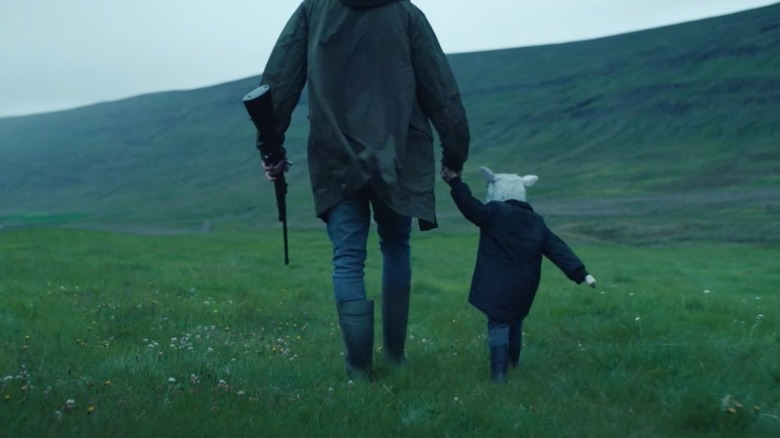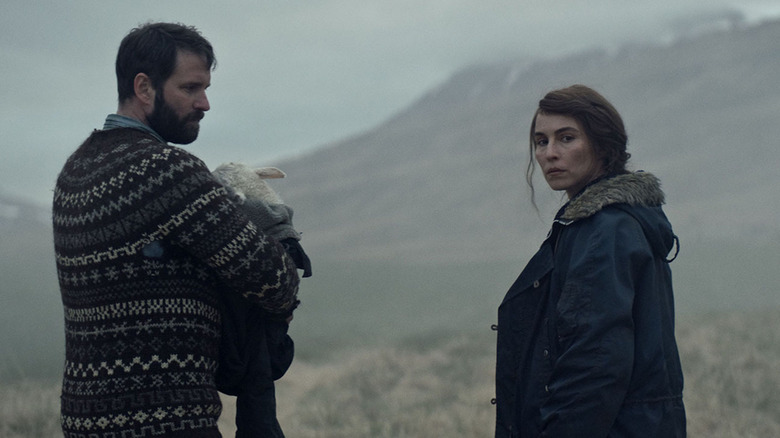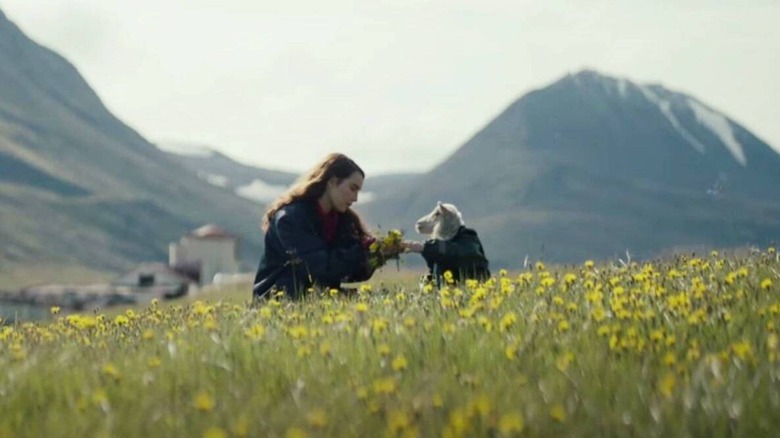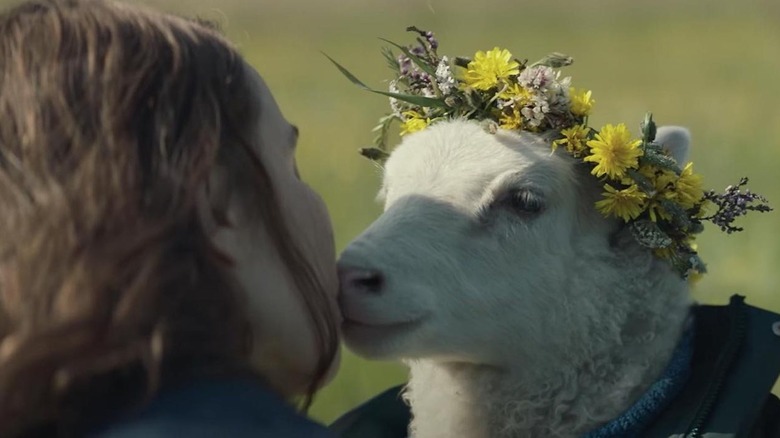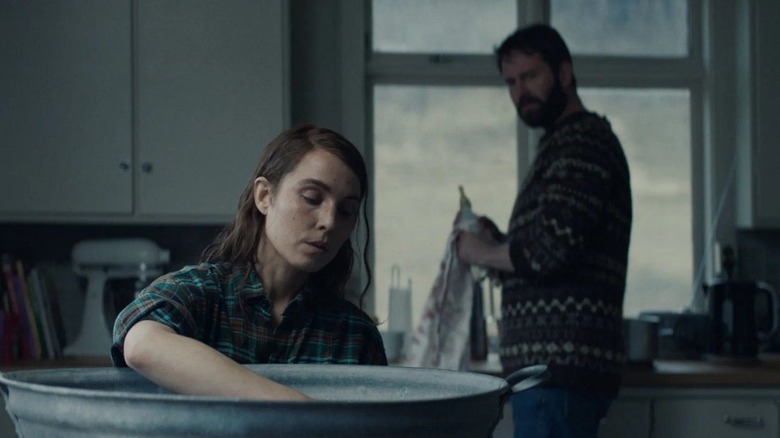A Surprisingly Wholesome Conversation With The Minds Behind A24's Lamb [Fantastic Fest]
As you'd expect from a horror movie released by A24, "Lamb" is bleak, unsettling, and designed to leave audiences wondering what the hell they just watched. But it's also surprisingly funny, and somehow, frequently adorable. If you speak to the folks who made it, this combination starts to make sense.
"Lamb" stars Noomi Rapace and Hilmir Snær Guðnason as a couple living on a remote Icelandic farm, tending to sheep and grappling with a recent tragedy. Then, a miracle: one of their sheep gives birth to a lamb that is ... unlike other lambs. It's half-lamb, half-human, and while some would recoil in horror, the film's protagonists see this baby as a blessing. They name her Ada. They take her into their home. But they are not prepared for what comes next.
Ada is remarkable, an effects-driven character who quickly won over the Fantastic Fest audience. Early shudders quickly transformed into cries of "awww" and approving giggles. In the middle of this bleak horror movie about man's attempt to coexist with nature lurks the cutest character you'll see on a screen in 2021.
I sat down with Noomi Rapace and co-writer/director Valdimar Jóhannsson after the screening, and the film's strange juggling of tones started to make sense. Rapace may be known to western audiences for her work in a number of Hollywood movies (including "Prometheus"), but Jóhannsson is a first-time feature filmmaker, clearly not used to conducting interviews. His answers are thoughtful, but he's shy and direct, often leaning on Rapace to help him elaborate on his ideas. But she clearly adores him, as you'll see in the Q&A below. The result is a most wholesome interview about a fairly twisted movie.
"The plan was to make a visual poem."
So I guess I want to start from your perspective here, Noomi. What did this look like when pitched to you?
Noomi Rapace: I can tell you exactly what happened. [Valdimar and producer Hrönn Kristinsdóttir] came to London, to my house, with his visual book. It was different paintings, photographs, drawings. It was really disturbing and beautiful at the same time. There was a book of collected poems by Sjón, the writer. And the script, and he gave it to me and it was very tender and sweet, but he didn't say much, and I went out in my backyard and had a cigarette and left me with that. And I was like, "Okay." And then I started looking through it and I was hooked and I just said straight away, "I've been waiting for this my whole life and I'm doing it."
Valdimar, there's definitely a fable, a fairy tale atmosphere to "Lamb." In your head, was there a more complex version that you chopped down to make this as simple and straightforward as possible?
Valdimar Jóhannsson: Me and Sjón, we just decided it should be just a very classical story with this one surrealist element. That was the plan. We thought it was ... It is a very classical story, but it took us time to work on a script. We started, I think, in 2009 and we worked on this ... I think after five years, we did the treatment. And then after that, Sjón took over and wrote the script, and then we had all the story. We knew it so well, but it took him a really short time to write the script.
Did you imagine this lamb child, Ada, first? How did you approach her as being the central image of your film?
Valdimar Jóhannsson: I had made a sketchbook.
Noomi Rapace: She was in there.
Valdimar Jóhannsson: Yeah.
Noomi Rapace: You were very visual. We're talking about what we could do next, then it feels like you very much start from an image and you ... We've been looking at paintings and drawings and you're very–
Valdimar Jóhannsson: Somehow–
Noomi Rapace: It's not a psychological process. It's more an emotional and visual [one].
Valdimar Jóhannsson: It's basically ... I think it's almost easier for me to find some image and start from there. I always have to see something. Because me and Sjon, in the beginning, we're always sending each other something that we should do as a scene that could be a painting or something. We're always trying to fit these visuals in the story somehow. The plan was to make a visual poem.
"I think people don't get when there's a real lamb or not."
Ada is remarkable, both as a character and as a visual effect. How much of Ada is a practical effect versus a digital effect? It seems like a combination of both.
Noomi Rapace: Yes, you're right. She was a combination of a lot of special effects, but she was there because we shot with lambs and babies. So in my head, I merged them into one, but it was very real. And a little bit the same, when I worked with Ridley Scott [on "Prometheus"], it was like a lot of the creatures and stuff was actually there. He was standing with a stick, with something on a thread and moving it and it was there. So, it was very little visual effects.
Valdimar Jóhannsson: We had four lambs, we are working with 10 children and also a puppy. So, it was a nice mix of all these elements.
Noomi Rapace: It's strange though, after a week or so I stopped thinking that it was something weird. She just became a part of us, right? And it was obviously a very different way of working because you had to have a lot of patience. In fact, there was the effort to shoot with babies and animals.
Valdimar Jóhannsson: There are so many shots in the film that are just real life. But I think people don't get when there's a real lamb or not.
It's really seamless. I was impressed because I really could not tell how the special effect was done. I just accepted Ada as a character, as opposed to a special effect.
Valdimar Jóhannsson: I think people stopped looking [for the visual effect] and trying to find something wrong because they have never seen a creature like this. So, you know that it is created.
Noomi Rapace: Must be.
Valdimar Jóhannsson: Yeah.
Noomi Rapace: Do they have them in Iceland?
"You start losing your mind a bit."
Watching it with an audience, I saw how the initial reaction to Ada was one of discomfort, but by the middle of the movie, people really fell in love with her. People started saying "aww" whenever she appeared on the screen. People were giggling and really accepted her as a character and a child, instead of being a horror image. Was that something you expected? That people would really fall in love with Ada like that?
Valdimar Jóhannsson: I hope so, because somehow I loved her so much, and I thought [she was a] cute creature. But I know that some audiences, they think it's creepy. [to Noomi] What do you think?
Noomi Rapace: I mean, for us, we didn't really think about how it was going to be perceived. It was not for anyone else. It was very much for us in the moment.
Valdimar Jóhannsson: We were just in so small a bubble, being with the team, and the crew and everybody.
Noomi Rapace: Living in this strange reality. And we shot up in the north side of Iceland and there's nothing there. When I left my house in the morning to drive into the valley, it was like a 45-minute drive into nothing. And you're like "Okay, this is my reality now." And all the animals in nature as well. The thing in Iceland, it never gets dark in the Summer. So you start losing your mind a bit.
Valdimar Jóhannsson: It was strange how normal it was. I remember sometimes when some people came for a visit, and they would just say "Where is your privacy?" And there'd be four lambs with diapers inside the house, and everybody was just [hums pleasantly]. It was so normal.
Noomi Rapace: I mean, we have to build the days around the animals a lot. Getting the lamb to fall asleep and everyone having to be quiet and then finally the lamb is sleeping. We're calling the team, and everyone's tiptoeing in. And then I'm holding the lamb and then it wakes up right when they start shooting. And it's like "Baaa!" Everyone out again! And I'm quite impatient. Normally, I have to work with myself so much. It's like, okay, we are not number one on the call sheet. The animals are driving this set.
"I knew that it could be a disaster, but somehow it worked."
How trainable are sheep?
Noomi Rapace: Not at all.
Because there's so many impressive moments with them in the film.
Noomi Rapace: Not Icelandic sheep, though.
Because the mother sheep, she's a character here. She has a perspective.
Noomi Rapace: She's quite intense.
You said the sheep aren't trainable. So how do you work with a sheep to get them to do what you need them to do?
Valdimar Jóhannsson: You know, since we looked for so many sheep and we were just in that area, but...
Noomi Rapace: But you looked for a face, you were looking for a specific face.
Valdimar Jóhannsson: Yeah. But we found this one and he could do some tricks.
Noomi Rapace: Could she though? Or was it just because we were holding her baby inside of the house?
Valdimar Jóhannsson: Yeah, but she really liked bread. I think somehow that it went better than I-
Noomi Rapace: Anticipated.
Valdimar Jóhannsson: Yeah. I knew that it could be a disaster, but somehow it worked.
One thing I couldn't help but notice, as somebody who has dogs and cats in his house, is that this family has a dog and they have a cat in addition to Ada. I couldn't help but think "Why would I think Ada is odd when I already have dogs and cats in my home and treat them like my family?" Was that something that you were directly trying to call attention to?
Valdimar Jóhannsson: I don't know.
Noomi Rapace: It's interesting though. How the dog and the cat sometimes are like, "Why is the lamb in the house?" It felt like they were reacting.
Valdimar Jóhannsson: What we really liked is we wanted to have like a different point of view. I think it's interesting to see the room, from the cat or dog because, or the sheep because somehow I think they have much better sense. I think they can know things before we know that something is dangerous or-
Noomi Rapace: The sixth sense.
Valdimar Jóhannsson: So we thought it would be interesting to have the animals.
Noomi Rapace: I also think Icelandic people ... And I mean, my family in Iceland are way more open to animals and nature than others. I feel like in the Icelandic culture, you just live very close to that. And those elements are very, a big part of your life. And my Icelandic grandma, when we're out riding, you wouldn't ride over certain hills because that's an elf hill or that can upset the fairies or whatever. It's this kind of awareness of creatures. Some we can't see in some are like right here. There's a kind of a normality to it, I would say.
"I feel very safe with you."
I saw [Hungarian filmmaker] Bela Tarr's name in the credits. How did he get involved as a producer on this?
Valdimar Jóhannsson: He was my mentor in Sarajevo. I stopped school in 2013, and then I was just working on "Lamb," and he was always helping me out, and reading the script.
Do you have any Bela Tarr stories? I feel like I have a mental image of who Bela Tarr is from his films. I'm curious about your interactions with him.
Noomi Rapace: I never met him. He was not on set.
Valdimar Jóhannsson: No. And he was planning to come to camp, but you know...
Noomi Rapace: I remember when I said to my team that I'm doing this film about a baby lamb and it's an Icelandic film, and this is the smallest budget I've ever worked on. My whole team's like "Wait, what? A baby lamb, what?" And they were like, "What has the director done?" And I was like, "Two short films". And, what? You meet him and you just fall in love with him. [to Valdimar] And I think you have that great, I don't know, power, charisma, sincerity, and everyone, like Bela Tarr, and me, and people around me, when they talk to you, people want to come in and support you. Because you're very faithful to something, to your truth. You never lie. And when you don't know the answer, you're very open. You're like, "I don't know." You know, and there's something very beautiful about that. So, you disarm people.
Valdimar Jóhannsson: And part of it, how good our relationship is, when we were working, is that we were so honest with each other.
Noomi Rapace: You're very safe. I feel very safe with you.
"Lamb" hits theaters on October 8, 2021.
